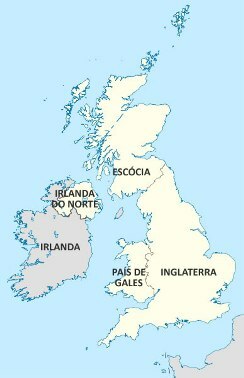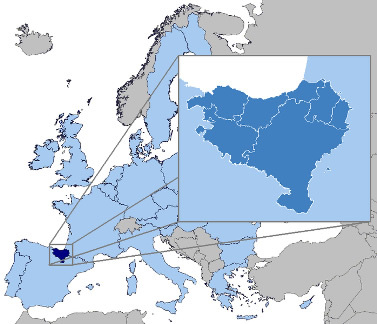The territorial divisions of nation-states most often happened according to the orders of power of each nation or civilization. Thus, the establishment of borders almost never represented the ethnic diversity of the most diverse regions of the world. As a legacy, there are numerous ethnic and separatist conflicts in the world, aimed at the emancipation or independence of some peoples, or the dispute over the same territory by two or more nations.
Conflicts in Northern Ireland
The conflict in Northern Ireland stretches back to the 20th century, when the population of Ireland began numerous protests against the UK's domination of the country. With that, the island was divided into Ireland and Northern Ireland, the second still under British rule.

Map of British rule over Ireland
In Northern Ireland, the Protestant majority (58%) of the population speaks out in support of the country's integration into Great Britain, while the Catholic minority defends independence and integration with Ireland (where Catholics form a large majority). As a result, many conflicts, protests and attacks on both sides took place – with emphasis on the Catholic terrorist organization IRA (Irish Republican Army – Irish Republican Army).
In 1999, an agreement was signed in which the IRA agreed to lay down its arms. In this agreement, Northern Ireland continued to belong to the United Kingdom, however, an autonomous government would be set up in the country in which Catholics would have the right to voice.
Spain: Catalans and Basques
Spain has two great nations, in addition to the Spaniards, placed in its territory: the Catalans and the Basques. Both want the formation of their respective National States, with the difference that, among the Basques, there are more radical separatist actions and programs.
The Catalan strategy is to try through institutional means to conquer its independence and create the Country of Catalonia. However, in 2010, the Constitutional Court of Spain officially rejected the recognition of Catalonia as a nation, denying lawsuits requesting the preference for the use of Catalan over Spanish in Organs public bodies of the region. If such recognition had been signed, the movement for the emancipation of the Catalans could gain greater strength.
Among the Basques, in 1975, in search of independence, the terrorist organization ETA (acronym in Basque meaning Basque Homeland and Freedom) was created. This organization had the initial intention of fighting the Spanish dictator Francisco Franco who carried out a violent repression against the Basques.

Location map of the Basque territory
After the country's redemocratization, the Basques achieved a certain political autonomy in the region, but without ceasing to belong to Spanish territory. With this, even without the support of the population, ETA continued with the carrying out of harsh and violent attacks. In 2007, they finally decided to lay down their arms.
Rwanda and Burundi: Hutus vs Tutsis
The territories of Rwanda and Burundi are the scene of a bloody struggle between Hutus and Tutsis, two African ethnic groups fighting for territorial control of these two countries. Both territories, after the partition of Africa, formed a single country, called Rwanda-Urundi, which belonged to Germany. After the defeat of the Germans in World War I, from 1919 onwards, the country became part of Belgium.
The Belgians then chose the Tutsi minority (15% of the population) to rule the country, subjugating the Hutu majority. In 1959, after numerous protests by the Hutus, there was a split between Rwanda and Burundi. In 1961, Rwanda gained its independence and became a Republic administered, this time, by the Hutus. The Tutsis, persecuted, went into exile in neighboring countries, including Burundi, which had also gained its independence.
Over the years, conflicts between Rwanda and Burundi and between Hutus and Tutsis still persist, with successive truces and resumption of clashes, resulting in a large number of deaths in the region.
Conflict in Darfur, Sudan.
Darfur is a region located in the western portion of Sudan, a country on the African continent. Since 2003, there has been a severe civil war between Islamic and non-Islamic peoples in this place. The Sudanese government has supported the Arab militia group called Janjaweed, which has been persecuting and annihilating non-Arab peoples or non-Muslim Arabs who lead an armed resistance.
Although the Darfur Conflict started in 2003, Sudan – which is currently the largest country in Africa – suffers from successive civil wars since 1956, when it gained its independence from the Kingdom United. In 2006, the UN Security Council sent troops to intervene in the conflict and imposed serious sanctions on the Sudanese government in order to curb the trade and proliferation of arms in the country. However, Sudan continues to supply the Janjaweed with weapons and the civil war – the third in the country's history – seems far from over.
Conflicts in the Kashmir region: India vs. Pakistan
Kashmir is a mountainous region located in northern India and northeastern Pakistan and has been targeted by disputes between India, China and Pakistan since 1947, after the end of colonial domination imposed by the Kingdom United.
At the end of British colonial domination, the vast territory of the British Indies was divided between India and Pakistan, but the region of Kashmir, with an Islamic majority but with a Hindu government, was left without a direction right. With this, it was decided that the region would form an autonomous territory, which provoked a series of rebellions by the Muslim majority against the Hindu government.
The government then requested support from India, which started to intervene militarily in the region. In response, Pakistan also sent troops in support of Muslims. The conflict ended with the establishment of a territorial division into two zones, one Pakistani, the other Indian.
However, conflicts still persist and the region is currently occupied by the two countries and also by China, which sees in the region a strategic position to have access to Tibet and Sinkiang, locations under Chinese rule.
the Kurds
The Kurds are currently known for being the largest nationless nation in the world. It is an ethnic group made up of more than 40 million people who inhabit regions of Iraq, Iran, Syria and Turkey.
The Kurds are suffering severe repression from the countries where they live. In Iraq, Saddam Hussein's dictatorship executed thousands of Kurds. In Turkey, they are also suffering a lot of repression from the government, which fears the loss of its territory.

The Kurdish population takes to the streets in search of independence¹
The independence and creation of a Kurdish state – Kurdistan, as the Kurds claim – is very unlikely, since the territory of the new country would occupy the entire territory. south-central Turkey and parts of Syria and Iraq, an extremely strategic region as it contains the sources of the Tigris and Euphrates rivers, which supply much of the country. Middle East.
______________________________
¹ Image credits: Sadik Gulec and Shutterstock
By Rodolfo Alves Pena
Graduated in Geography
Source: Brazil School - https://brasilescola.uol.com.br/geografia/conflitos-etnicos.htm


